Table of Contents

Morning screen routine issues can ruin or save your whole day as a parent. You’re familiar with the script: your child picks up the tablet in the morning, vowing only five minutes, and before you know it, you’re running late to school, work, and even your own sanity. Skip ahead to evening time, and it’s the same battle—one more game, one more video, one more reason.
That was my life—until Focus Fun came along.
What if I said the problem isn’t screen time, but when and how it’s done?
Here’s how Focus Fun converted our screen fights into order, serenity, and bonding through 7 brilliant secrets you can use today.
Trick #1: Transform Screens from Enemy to Best Friend with Routine-Based Apps
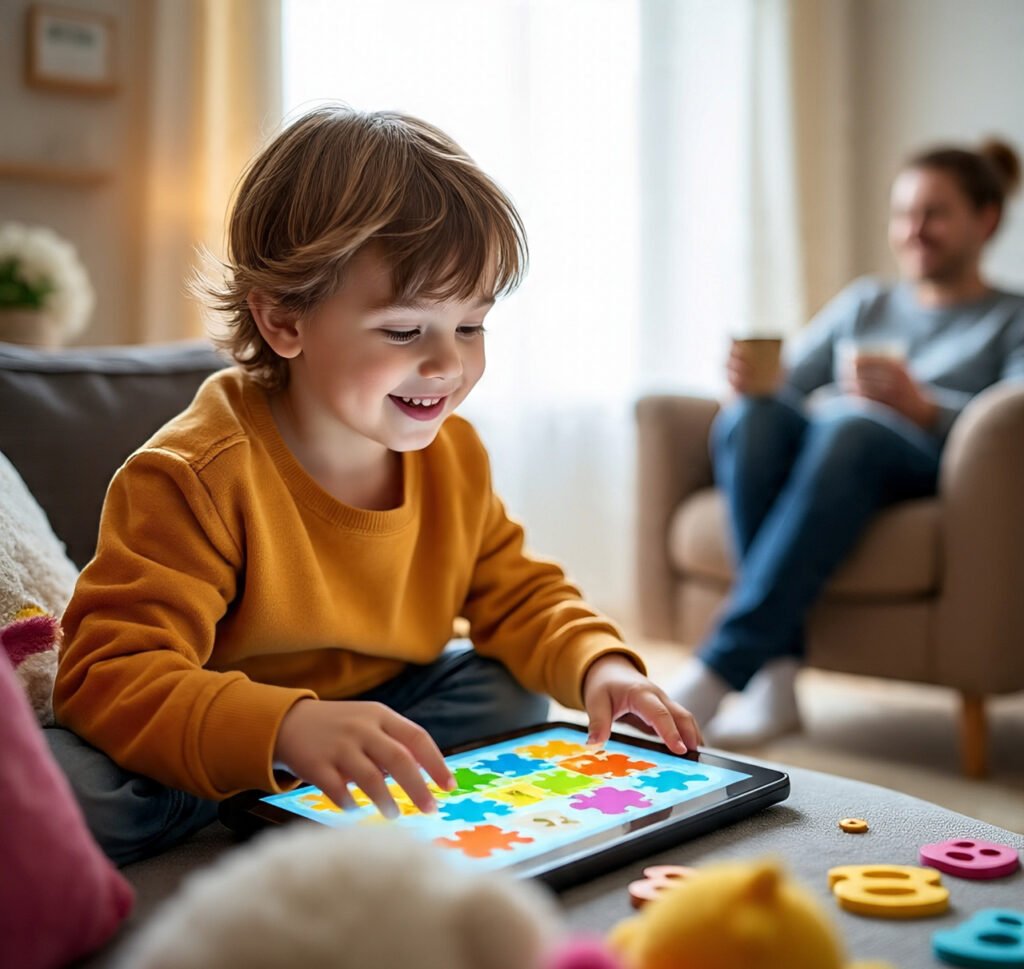
It’s easy to point fingers at screens for causing the chaos, but the reality is screens are merely tools. The issue? Unstructured use.
Focus Fun doesn’t merely provide something for your child to do—something meaningful. It provides purpose to their screen time. You determine the schedule. You select the games. You decide how long it lasts.
Rather than fighting routines, my son Aarav started anticipating mornings since Focus Fun made them enjoyable and predictable. He knew he was able to play his favorite quiz for 10 minutes—and that was all. Once the timer went off, the screen did not entice him anymore.
This alone shifted our mornings from chaotic to seamless.
Trick #2: Create a 3-Step Morning Screen Routine
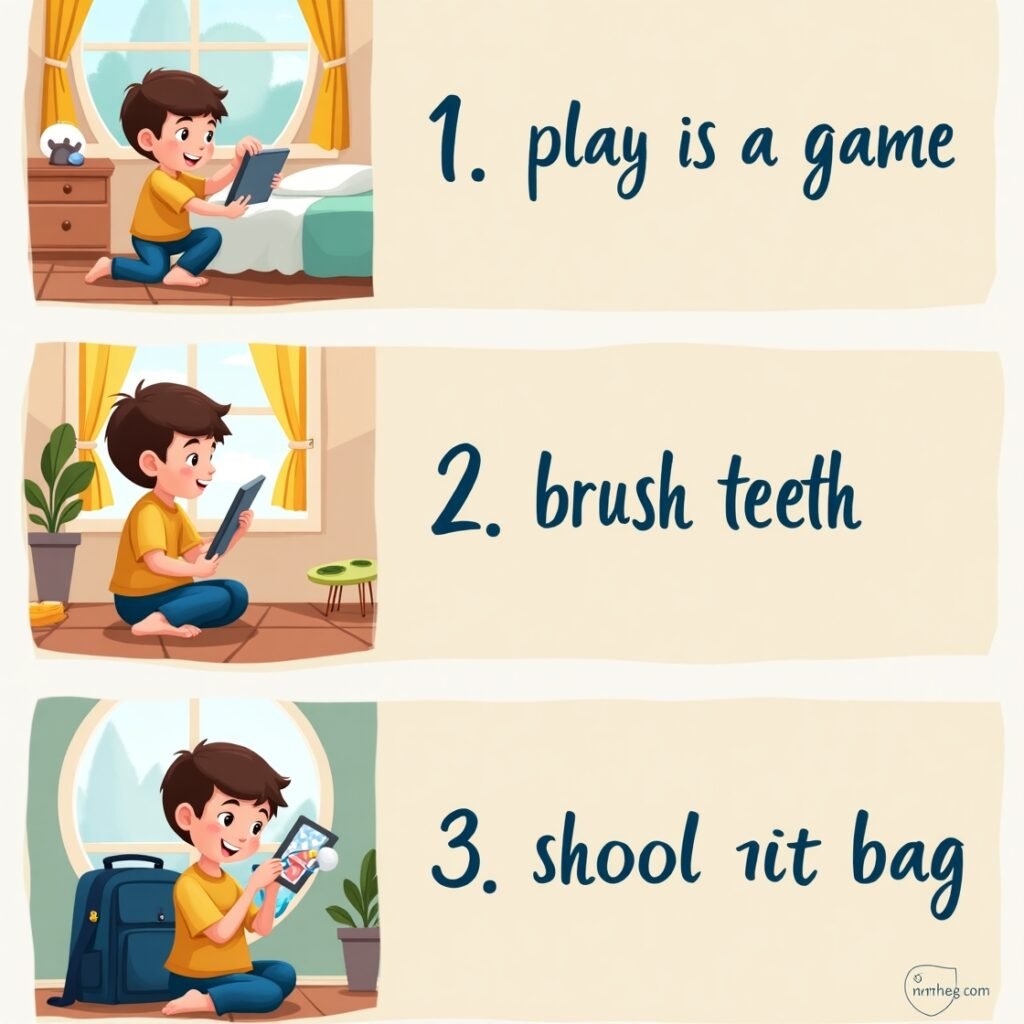
With Focus Fun, I developed a 3-step morning screen routine that functioned like an alarm clock and learning booster in one.
First, Aarav has a brief visual game such as “Find the Picture” to rouse his brain. Second, he completes a 5-minute vocabulary burst through the “Word Missing” activity. Lastly, a soothing music fade-out signals him to brush and pack up.
The good news? I don’t have to utter a word. The app handles all the guiding.
It’s incredible how efficiently kids adjust when technology directs them rather than overwhelming them.
Trick #3: Use the 20-Minute Evening Rule (Screens That Soothe, Not Stimulate)
We used to let him have a screen prior to bedtime because we believed it relaxed him. But the opposite was occurring—his head would be racing long after the screen was gone. That’s when I discovered the golden rule: screens should relax, not stimulate, particularly at night.
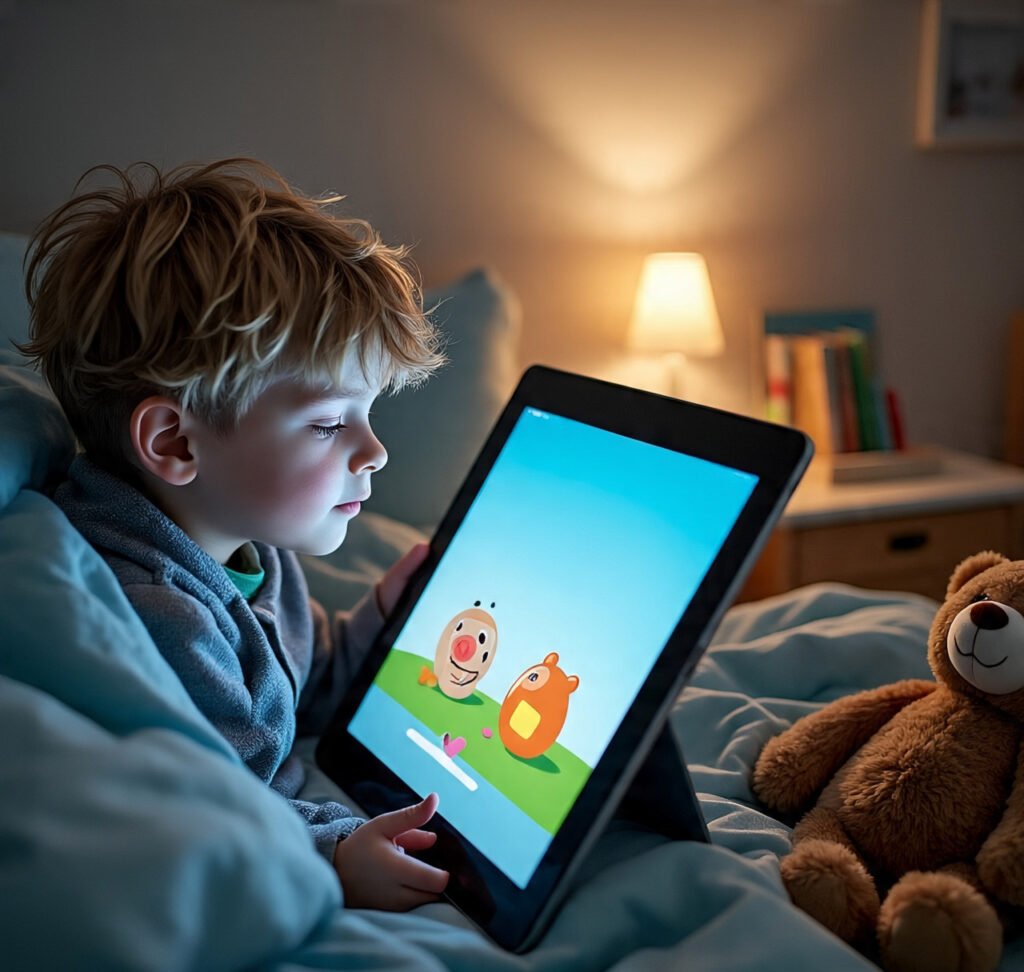
Focus Fun features bedtime-friendly activities meant to calm down, not fire up. No more YouTube clips or interminable games. Aarav ends the day with a soothing Focus Fun puzzle, and then a brief recap quiz.
Then the screen softly locks with a bedtime message such as “Goodnight, Brain Builder!“
Now, he’s in bed by 9 and sleeps through. No more wriggling, squirming, or pleading for “one more minute.”
Trick #4: Let the App Be the Boss (Not You)
Parenting is tiresome when you’re always the rule-keeper. “Turn it off now!” “No more screen!” “Go brush your teeth!”
It’s a power struggle.
But when an app like Focus Fun enforces the rules with automated transitions and timed lockouts, the pressure is off. You’re no longer the “bad cop.” You’re simply sticking to the plan together.
Aarav pays more attention when it’s the app providing the reminder, not me. He even reminds me now: “It’s almost time to stop. Let me finish this round.”
Who knew screens could actually help put an end to screen overuse?
Trick #5: Shift the Focus from Entertainment to Engagement
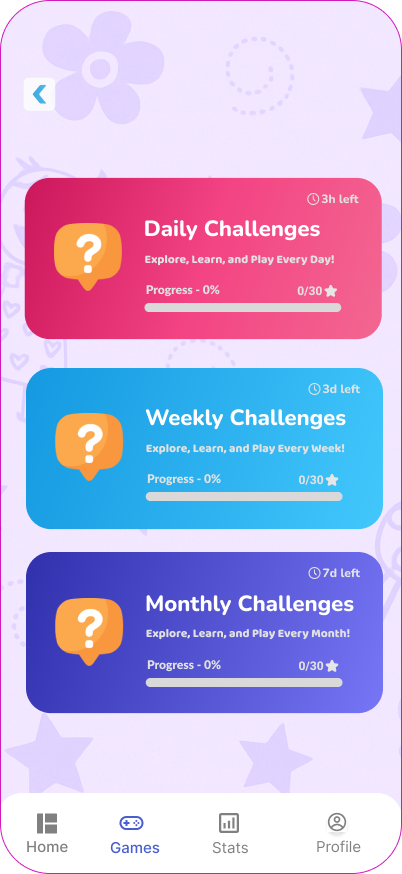
Regular screen apps are designed to entertain. That’s the trap. Focus Fun, on the other hand, is built to engage—i.e., to activate thinking, not simply watching.
Each morning and evening routine has activities that build concentration, memory, vocabulary, and math confidence. Your child isn’t spacing out—they’re tuning in.
This change in screen intent significantly improved Aarav’s demeanor. He wasn’t hyper or irritable after screen time anymore. Instead, he was mentally warmed up or serenely settled, depending on the hour.
Focus Fun transformed our screen moments into development moments.
Trick #6: Create “No Chaos Zones” in Your Day
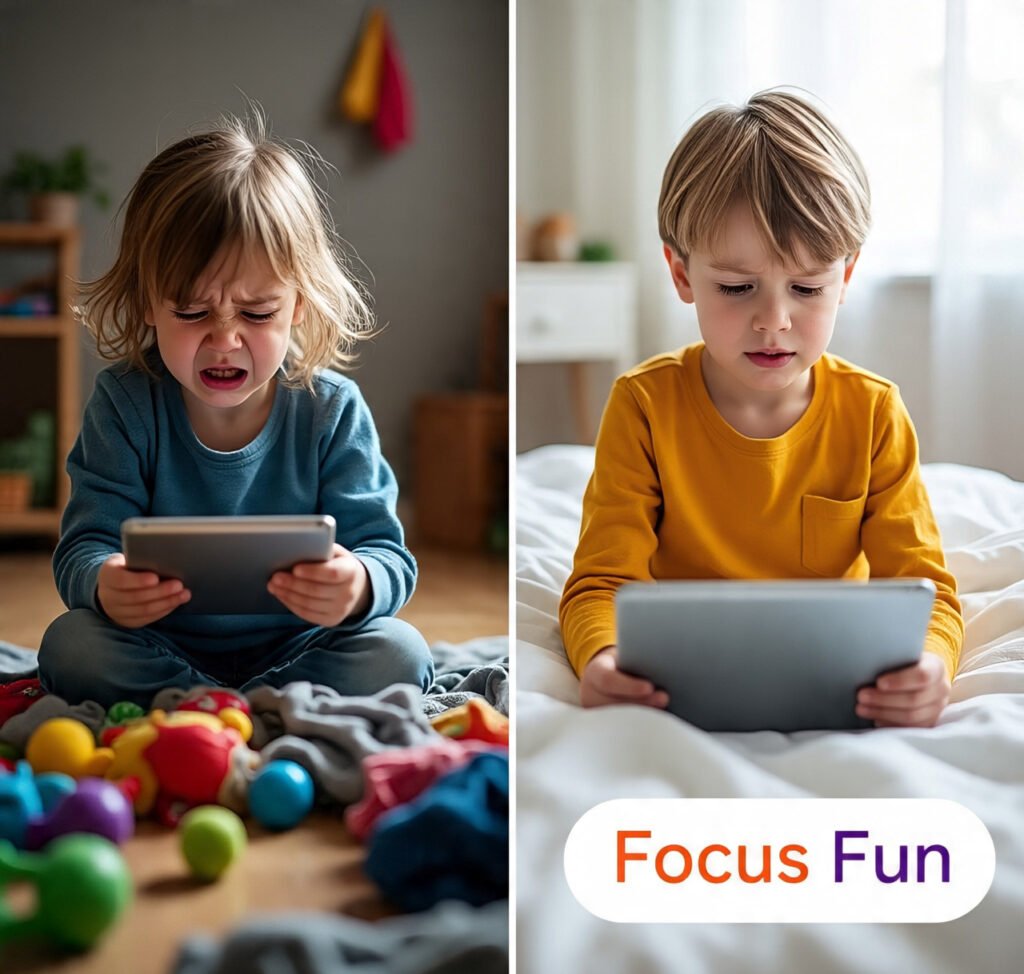
Ever notice how screens create the most drama during transitions—waking up, leaving for school, going to bed?
That’s because kids resist abrupt change. They need bridges, not cliffs.
Focus Fun builds those bridges through clear beginnings, interesting middles, and peaceful endings. A game begins. It lasts for a specific amount of time. It concludes with a soft push to the next step—whether that’s brushing teeth or bed time.
You no longer leap from “You’re watching cartoons” to “Brush your teeth now!” It’s a smooth transition in steps, and change doesn’t feel forced.
The outcome? Less fighting, more action.
Trick #7: Make Positive Screen Associations to Create Improved Habits
Screen time was a battle before Focus Fun. Now it’s a reward and a rhythm. Aarav regards it as routine, not the highlight or the taboo fruit.
He knows he’ll receive 15–20 minutes in the morning—if only he dresses in time. He knows he earns his relaxing games at night—if he completes homework.
This system creates healthy boundaries rather than resistance.
And because Focus Fun is instructive, I don’t feel guilty. I feel proud knowing his screen time is constructing focus, confidence, and structure.
It’s no longer a distraction—it’s a discipline.
The Transformation We Didn’t Expect

I assumed this process was about mastering screen time. But what I received was much larger.
I received calm mornings.
I received serene bedtimes.
I retrieved my child—not the one spaced out on a screen, but the one who sings in the shower and poses big questions at breakfast.
Focus Fun gave us a rhythm, and within that rhythm, we discovered happiness.
This was not a parenting shortcut. It was a parenting rescue.
Final Thoughts: What You Can Start Today
If your home is anything like our old home, nights are terrible and mornings are stressful. But that doesn’t have to be your future.
Here’s what you can do immediately:
- Download Focus Fun and check out the customizable routine settings.
- Create a 15-minute morning routine with learning games and auto-lock.
- Create a bedtime routine with relaxing activities and fade-out music.
- Let the app instruct your child, while you get to sit back and enjoy the serenity.
Your kid will adapt. And actually, they’ll flourish.
Because when screen time is intelligent, it becomes your ultimate parenting partner not your worst foe.
FAQs
1. Why shouldn’t parents take away phones at night?
→ Because sudden bans cause resistance—Focus Fun offers calming, brain-boosting alternatives to end the day peacefully.
2. What happens if you spend 24 hours on your phone?
→ Disrupted sleep, poor mood, and low energy—replacing aimless scrolling with Focus Fun’s focused play can break the cycle.
3. How to break mobile addiction?
→ By replacing unhealthy screen routines (especially before bed and after waking) with structured, time-limited apps like Focus Fun.
4. How to stop using phone ADHD?
→ Gamified apps like Focus Fun support attention control—especially during high-distraction periods like mornings and bedtime.
5. How to deal with someone who is always on their phone?
→ Guide them toward positive screen rituals—morning brain games or bedtime story modes in Focus Fun work wonders for kids.
